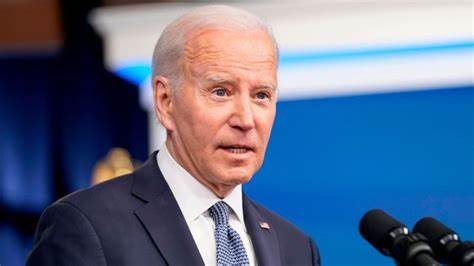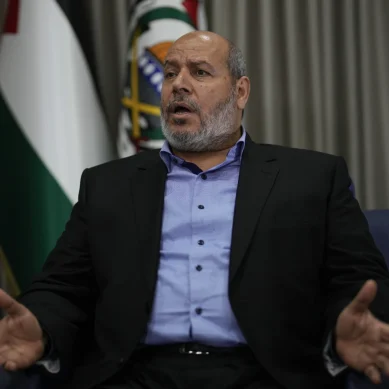
Joe Biden and Donald Trump are both facing special counsel investigations into their retention of classified documents after leaving office. The materials discovered in locations controlled by Biden reportedly relate to his time as vice president under Barack Obama and Trump’s are from his tenure as president.
Democrats have sought to draw sharp distinctions between the two cases, emphasising that Biden’s team self-reported the discovery of the documents and are cooperating with investigators, while Trump world misled the National Archives for months, resisted fully complying with a subpoena, and argued that he had every right to take the materials.
Republicans have declared the investigation of Trump, which included an FBI search of his residence at Mar-a-Lago and the seizure of dozens of boxes of materials, a witch-hunt. Biden has said he had no idea the documents were in his possession or what they even contain.
To be sure, this is not simply a case of both sides do it and therefore the government response and legal outcomes should be identical. There are significant differences between the two cases that warrant great attention. But obfuscated by the political battles and competing narratives from the partisan commentariat are a series of important issues about the US system of rampant overclassification, the treatment of whistle-blowers, and the uneven application of laws surrounding the mishandling of classified documents depending on the stature of the violator.
“I don’t want to draw any equivalence between Biden’s actions and Trump’s, and I don’t want to provide excuses for either president’s conduct, but both of these episodes are in part the result of a totally broken classification system,” said Jameel Jaffer, executive director of the Knight First Amendment Institute at Columbia University.
“Far too much information is classified, and many of the things that are classified are classified for the wrong reasons — not because their disclosure would harm national security, but because their disclosure would be embarrassing or inconvenient or simply because it’s easier for bureaucrats to classify them than not to.”
Trump was famously impeached twice during his presidency, although he was acquitted by the Senate in both cases. Democrats are hoping the former president encounters a different fate at the end of the current investigations into his conduct in the waning days of his administration and his retention of classified documents as a private citizen.
As sitting president, Biden will have to contend not just with the special counsel probe, but also congressional investigations run by Republicans who have made no secret of their desire to bring him down. Given the stakes not just for Biden individually but also for his presidency, it is important to review the chronology of events as we currently understand them.
On November 2, 2022, a week before the high-stakes midterm elections, lawyers for Biden discovered some forbidden fruit inside a seldom-used office in a think tank bearing the name of the 46th president. The lawyers were there to close down the office at the Penn Biden Center for Diplomacy and Global Engagement, which Biden inaugurated in 2018 following his eight years as vice president.
According to Biden’s legal team, as they packed up Biden’s papers and other items, the lawyers found a batch of what appeared to be classified materials inside a locked closet in Biden’s office suite.
Biden’s team, according to their own account, swiftly reported the matter to the National Archives and offered full cooperation in determining how the documents arrived at the unsecured facility. The president, they claimed, was unaware of the documents and had no knowledge of how they came to be there.
“I was briefed about this discovery and surprised to learn that there were any government records that were taken there to that office, but I don’t know what’s in the documents either,” Biden later said. On November 9, a day after the congressional elections, the Justice Department and FBI began an initial assessment of the matter, and, on November 14, Attorney General Merrick Garland assigned a US attorney to initiate a preliminary investigation.
Biden’s team kept this all a secret, and we may never know for how long they intended to do that.
Perhaps in a different era, this matter would not have given off the vibe of a five-alarm fire. But the timing of this discovery, both in the immediate political sense and the broader historical sense, could not have been worse for Biden. But then, it did get worse.
The president’s team did not inform the public about the classified documents once they were discovered. They did not inform the public that the FBI and Justice Department had launched an investigation into the sitting president on a potentially serious matter involving classified materials that had been taken to an unsecured facility and remained there for years.
The president and his advisers knew very well the political tripwire they had crossed and the implications it could have had not just on the midterm elections, but also on the case against his predecessor for the very same issue. So, Biden’s team kept this all a secret, and we may never know for how long they intended to do that.
“The White House was hoping for a speedy inquiry that would find no intentional mishandling of the documents, planning to disclose the matter only after Justice issued its all-clear,” according to the Washington Post.
There are vast differences between the Biden and Trump cases, both in the volume of materials and the manner in which the two sides have handled their situations and approached the investigations. Biden’s team claims he was not aware the handful of documents were in his custody and immediately reported them to the National Archives, while Trump has said he had the right to take the materials – numbering more than 300 classified documents – to Mar-a-Lago.
Trump’s staff, at the end of his presidency had ferried hundreds of classified materials from Washington, DC, to Trump’s Palm Beach resort. It is not uncommon for presidents to violate the Presidential Records Act, but it is unusual to have a president tenaciously resist efforts by the National Archives to take custody of improperly handled materials, especially at the scale involved in the Trump case.
From the beginning, Trump’s team consistently stymied the efforts of the government to take custody of the documents. In early 2022, Trump grudgingly handed over some materials to the National Archives, but he and his aides fiercely resisted returning additional documents, including through conduct that may constitute obstruction of justice.
Among the documents initially recovered from Trump were reportedly materials from the CIA, FBI, National Security Agency, and other agencies.
- The Intercept report / by Jeremy Scahill / jeremy.scahill@theintercept.com @jeremyscahill











